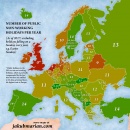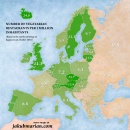 |
Logic behind flats and sharps in musical scales
When you learn the traditional western music notation in order to be able to play an instrument, one of the first things you learn is the (...)
October 28, 2016 – Jakub Marian – Music
|
 |
Difference between ‘to be on fire’ and ‘to burn’
There is no significant difference between “something being on fire” and “something burning”, where “something” is a flammable material. (...)
October 26, 2016 – Jakub Marian – English
|
 |
The “432 Hz vs. 440 Hz” conspiracy theory
Would you believe that there is a conspiracy theory about the way we tune musical instruments? And that this theory even involves the (...)
October 19, 2016 – Jakub Marian – Music
|
 |
Google autocomplete reveals burning questions about European countries
Do you know how when you start typing a search query into Google, it gives you suggestions based on what other people are searching for? (...)
October 15, 2016 – Jakub Marian – Maps
|
 |
‘Obliged’ vs. ‘obligated’ in English
The only verb form of “obligation” that is traditionally considered correct is oblige, not “obligate”, so you cannot make a mistake by (...)
October 14, 2016 – Jakub Marian – English
|
By the way, have you already seen my brand new web app for non-native speakers of English? It's based on reading texts and learning by having all meanings, pronunciations, grammar forms etc. easily accessible. It looks like this:
 |
Number of public holidays by country in Europe
A public holiday, also called national holiday or legal holiday, is a special holiday established by each country’s (or autonomous (...)
October 11, 2016 – Jakub Marian – Maps
|
 |
Map of ‘vegetarian friendliness’ (number of vegetarian restaurants) in Europe by country
The original idea of this article was to create a map showing the percentage of the population following a vegetarian diet, but it turned (...)
October 2, 2016 – Jakub Marian – Maps
|
 |
Two opposite meanings of “arguable”
The verb “argue” has two significantly different (but related) meanings. First, you can argue with someone about something (or over (...)
September 27, 2016 – Jakub Marian – English
|
 |
‘Inhabited’ or ‘inhabitated’ in English
Long story short, the correct form is inhabited. The reason why people (especially non-native speakers) tend to think that the word is (...)
September 25, 2016 – Jakub Marian – English
|
 |
Difference between “float”, “swim”, and “sail” in English
Non-native speakers of English sometimes incorrectly say that a non-living thing, such as a boat or a piece of wood, “swims in the water” (...)
September 23, 2016 – Jakub Marian – English
|
